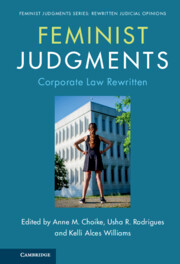Book contents
- Feminist Judgments: Corporate Law Rewritten
- Feminist Judgments Series Editors
- Advisory Panel for Feminist Judgments Series
- Feminist Judgments: Corporate Law Rewritten
- Copyright page
- Dedication
- Contents
- Advisory Panel for Feminist Judgments: Corporate Law Rewritten
- Notes on Contributors
- Acknowledgments
- About the Cover Art
- Table of Cases
- Part I Introduction and Overview
- Part II Legal Personality, Identity, and Limited Liability of Corporate Entities
- Part III Role and Purpose of the Corporation and Corporate Combinations in Society
- Part IV Fiduciary Duties in Corporate Governance
- Part V Closely Held Businesses and Other Considerations Regarding the Composition of Boards, Management, and Owners
- Part VI Protecting Investors and Potential Investors in Corporations
- Part VII From Foundations to Future Directions
- 17 The Importance of Incorporating Feminist Perspectives in Corporate Law: Analyzing the Foundations and Future Directions of Feminist and Feminist-Inspired Corporate Law Scholarship
- Index
17 - The Importance of Incorporating Feminist Perspectives in Corporate Law: Analyzing the Foundations and Future Directions of Feminist and Feminist-Inspired Corporate Law Scholarship
from Part VII - From Foundations to Future Directions
Published online by Cambridge University Press: 15 January 2023
- Feminist Judgments: Corporate Law Rewritten
- Feminist Judgments Series Editors
- Advisory Panel for Feminist Judgments Series
- Feminist Judgments: Corporate Law Rewritten
- Copyright page
- Dedication
- Contents
- Advisory Panel for Feminist Judgments: Corporate Law Rewritten
- Notes on Contributors
- Acknowledgments
- About the Cover Art
- Table of Cases
- Part I Introduction and Overview
- Part II Legal Personality, Identity, and Limited Liability of Corporate Entities
- Part III Role and Purpose of the Corporation and Corporate Combinations in Society
- Part IV Fiduciary Duties in Corporate Governance
- Part V Closely Held Businesses and Other Considerations Regarding the Composition of Boards, Management, and Owners
- Part VI Protecting Investors and Potential Investors in Corporations
- Part VII From Foundations to Future Directions
- 17 The Importance of Incorporating Feminist Perspectives in Corporate Law: Analyzing the Foundations and Future Directions of Feminist and Feminist-Inspired Corporate Law Scholarship
- Index
Summary
Using a communal approach that employs diverse feminist perspectives, co-authors Anne Choike, Martha Albertson Fineman, and Cheryl L. Wade argue that feminism offers corporate law a vitally important analytical tool to advance the creation of a more just legal framework governing corporations and their stakeholders. Choike, Fineman, and Wade highlight feminist corporate law literature that uses various feminist and feminist-inspired approaches to illuminate how using such perspectives can facilitate critical examination of corporate law concepts (including corporate personhood, limited liability, board diversity, firm ownership, and theories of the firm). Choike, Fineman and Wade argue that each type of feminism offers unique tools to analyze corporate law. Liberal feminism’s focus on gender identity, among other intersectional identity characteristics, reveals corporate law’s inequitable substance and operation. Relational feminism’s attention to gendered values and ethical frameworks highlights their impact upon the role and function of the corporation. Dominance feminism’s focus on power enables critique of implicitly gendered privileges that corporate law confers upon corporate actors. Feminism-inspired universal theories like vulnerability theory transcend gender to consider how institutional relationships in corporate law, such as principal/agent and worker/owner, may be unequal. Professional practitioners, scholars, and students can benefit from this chapter.
Keywords
- Type
- Chapter
- Information
- Feminist Judgments: Corporate Law Rewritten , pp. 419 - 446Publisher: Cambridge University PressPrint publication year: 2023



